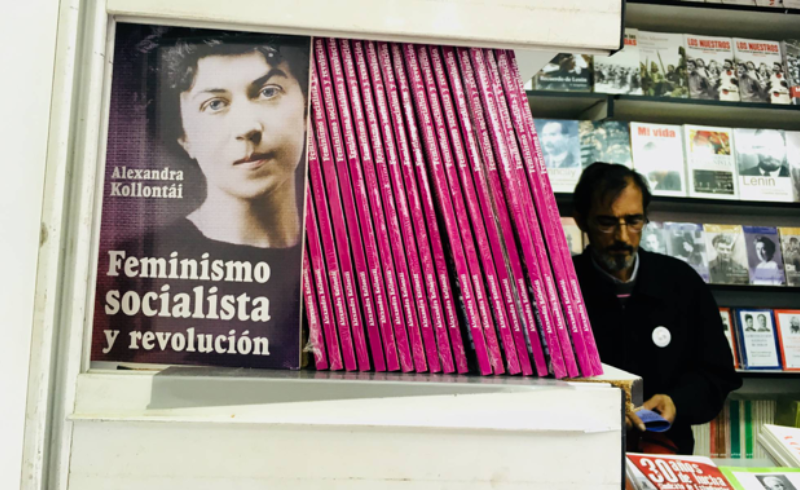
Amor Rojo by Dora García
The figure of Alexandra Kollontai (1872-1952), a Marxist theorist and October revolutionary, radical feminist and sexual activist at a time when those terms were not yet in use, is at the center of an experimental fiction film walking the labyrinth of female freedom, sexual emancipation, and love as weapon; and bridging an ocean from Moscow to Mexico, and from socialist feminism (Kollontai) to revolutionary love (Chela Sandoval).
In recent years we have witnessed two parallel, and apparently incompatible, phenomena: the rise in politics of a series of strongmen, slightly ridiculous in their dictatorial stances, archetypical examples of the heteropatriarchy, so extreme that sometimes they might be taken as a caricature of it. And then, a formidable awakening of feminism, as a solid wall of resistance and opposition, a new, transnational form of feminism that binds together feminism with ecology, ecology with postcolonial struggle and a new form of socialism. A placard in the most recent demonstrations in Argentina said it clearly: feminism is socialism is ecology is postcolonial struggle.
In this atmosphere, we assist the third or fourth resurrection of the legacy of Marxist revolutionary and socialist feminist Alexandra Kollontai. But the surprise to the vindication of Kollontai’s name is not so much temporal (she has enjoyed periodical "resurrections" in the 70s and 90s) as it is geographical: the name Kollontai appears in countless groups of activists and associations, music groups, films, and papers in Spain and South America.
The last wave of feminism in Latin America agrees with Kollontai that feminism goes beyond the struggle for equality of rights for men and women – a complete change of paradigm is necessary, a feminization of politics that completely subverts the relations between sexes, between classes, between countries, and between humans and planet.
I am convinced of the importance of vindicating the heritage of Kollontai’s ideas; certainly she was not unique, certainly she was not alone, but because of a set of cultural and historical circumstances, she has managed to bridge historical periods (from those first years of the XXth to these first years of the XXIst century) and geographical distances (Europe and South America). It is her name that is linked to a form of solidarity that today, in the face of the last political developments, has become a matter of life or death for many women and communities.
Read more on Amor Rojo: https://amor-rojo.tumblr.com/
DORA GARCÍA lives and works in Barcelona and Oslo. She teaches currently at Oslo National Academy of the Arts, Norway, and HEAD Genève, Switzerland. She has represented Spain at the Venice Biennale in 2011 and was present again in the Venice Biennale 2013. She took part in the 56th Venice International Art Exhibition, dOCUMENTA(13) and other international events such as Münster Sculpture Projects in 2007, Sydney Biennale 2008 and Sao Paulo Biennale 2010. Her work is largely performative and deals with issues related to community and individuality in contemporary society, exploring the political potential of marginal positions, paying homage to eccentric characters and antiheroes. These eccentric characters have often been the center of her film projects, such as The Deviant Majority (2010) and The Joycean Society (2013), and Segunda Vez (2018).
Production: OsloBIENNIALEN (accompanied by Eva González-Sancho), Auguste Orts
Stage of development: research and development
Involved Participants |
|||
|---|---|---|---|
| Dora García | |||
